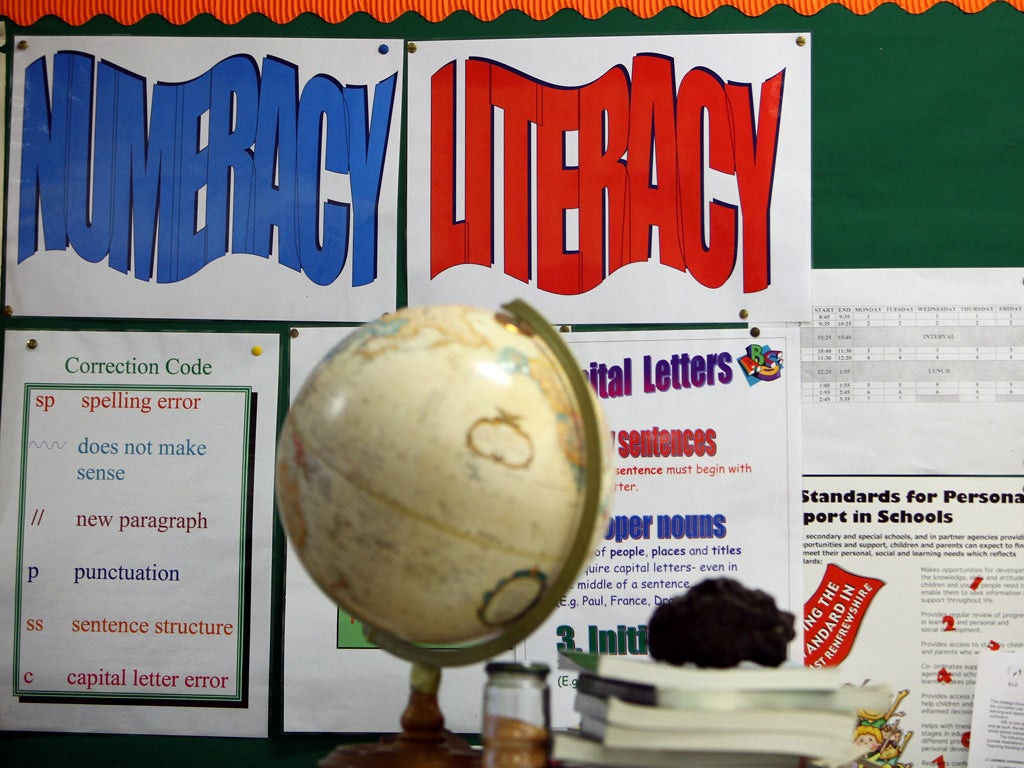The obvious reasons why UK literacy and numeracy skills are among the lowest in the developed world
We need a massive change of attitude if we’re to improve basic education and give children what they’re entitled to


Your support helps us to tell the story
From reproductive rights to climate change to Big Tech, The Independent is on the ground when the story is developing. Whether it's investigating the financials of Elon Musk's pro-Trump PAC or producing our latest documentary, 'The A Word', which shines a light on the American women fighting for reproductive rights, we know how important it is to parse out the facts from the messaging.
At such a critical moment in US history, we need reporters on the ground. Your donation allows us to keep sending journalists to speak to both sides of the story.
The Independent is trusted by Americans across the entire political spectrum. And unlike many other quality news outlets, we choose not to lock Americans out of our reporting and analysis with paywalls. We believe quality journalism should be available to everyone, paid for by those who can afford it.
Your support makes all the difference.I am sighing. And I’ve been sighing ever since I began my 36 year teaching career in 1968 and discovered to my horror that my first year secondary pupils couldn’t read ‘The dog got wet and Tom had to rub him dry,’ write a sentence or give change from a ten shilling note (yes, that’s how long ago it was) for an item costing five shillings.
Now a major international report from the Organisation for Economic Co-operation (OECD) finds that school leavers in England and Northern Ireland have lower levels of literacy and numeracy than anywhere in the developed world except Spain, Italy and - in the case of numeracy – the US.
I’m sad but not in the least surprised. The evidence is all around us, although the education establishment gets very shirty and defensive when, for example, the CBI points out that business needs young employees who can read, write and count but it isn’t getting them.
Cue for much governmental hand wringing and increasingly desperate quick fix strategies – the equivalent of trying to cure measles by scratching off the spots.
Before you can actually cure measles you have to work out what’s causing it. And I think there are two main underlying reasons for the illiteracy/innumumeracy epidemic in this country.
I shall make few friends for spelling them out but …
First, teaching has long been a low status profession in most of the UK. It does not attract the best brains and you cannot pass on what you aren’t totally on top of yourself.
When I trained the minimum requirement for a trainee teacher was 5 O levels (equivalent to 5 GCSEs at A*-C). No one cared what subjects they were in and you didn’t need A levels.
So I sat incredulously alongside teacher training college students and later worked with teachers in secondary schools who had almost no academic knowledge at all beyond a swatted up syllabus if they were conscientious. Some hadn’t even got a basic O Level English or maths pass. Every teacher should be teaching English irrespective of the subject, but tens of thousands simply couldn’t. Their influence lives on in the pupils they taught.
Teaching as an all-graduate profession was gradually phased in from the 1980s. Sounds good. But isn’t it worrying that young teachers now have to take – and many struggle with - literacy and numeracy tests after they’ve trained but before they start work? These people have been in school for 12 years from age 4-18 and spent three years in university, but we still aren’t confident that they can read and do number work? I rest my case.
The second reason is the failure to teach reading. Decoding is drummed into small children so that most of them more or less learn to decipher the squiggles on the page. Then the attitude is ‘Oh good Ruby or Fred can read now. Time to move on to something else.’
In fact – that’s the point at which a child should start to learn to read – lots and lots of books so that he or she builds up stamina. And that means seeing adults read and being given quiet space and time, both at school and at home, to read independently.
They also need to see teachers and other adults reading all the time. You don’t, please note, learn to read by talking about it. You learn by doing it - as with swimming or driving. Without such ongoing exposure the child merely loses through lack of practice the tentative skill s/he has acquired – as the OECD report shows so damningly.
We need a massive change of attitude if we’re to improve basic education and give children what they’re entitled to. For a start we should completely revolutionise teacher training so that we get the brightest, best and most accomplished people into classrooms. And they’ll have to be paid accordingly.
And all adults associated with children – not to mention Ofsted – must get their heads round what you have to do to turn children into readers.
See why I’m sighing?
Join our commenting forum
Join thought-provoking conversations, follow other Independent readers and see their replies
Comments